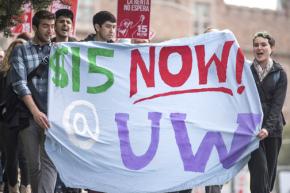A step toward fair pay at UW
reports on another step forward in the fight for decent wages at the University of Washington.
UNIVERSITY OF Washington (UW) students and workers in Seattle achieved another milestone in the fight for a higher minimum wage on April 10. After delaying, "studying" and expressing sympathy but taking no action, the UW administration finally agreed to pay all student workers at least $11 an hour retroactive to April 1.
The raise will also cover student workers on UW campuses outside the city--in Bothell and Tacoma where they don't have Seattle's minimum wage. The city of Seattle had mandated an $11 an hour minimum wage for all large employers in the city as of April 1.
The UW administration--imitating the obstructionism of the Port of Seattle, which won a legal victory for low-wage employers at the Seattle-Tacoma International Airport when a court agreed that they should be exempted from a local referendum requiring a minimum-wage increase--claimed that the university wasn't covered by Seattle's law passed last year.
A lively demonstration and march around campus on April 1 helped to change the political climate at UW. In response to 200 protesters demanding an $11 minimum wage, acting President Ana Mari Cauce and Assistant Vice President of Labor Relations Peter Denis claimed sympathy, but said much more study was needed. Continuing agitation against institutional racism at the UW by the Black Lives Matter movement helped strengthen the fight for a living wage on campus.

Another demonstration on April 8 finally pushed the administration over the edge. That night, the Board of Regents--mostly corporate officials appointed by the state's governor--met at the UW Club for an expected quiet dinner. But before they could get down to business, several dozen students and campus workers disrupted their dinner.
Students stood near the tables, spoke about why they needed an increase in the minimum wage and chanted so the Regents could get no work done. The six campus police present weren't enough to eject the students and workers. In spite of pleas from the Regents and from police, the chanting continued. Finally, police hustled the flummoxed Regents downstairs to a private room, leaving their hors-d'oeuvres behind.
MUCH MORE needs to be done. Eleven dollars an hour is still way too low, especially given Seattle's high cost of living. And the UW administrators--some of whom, like Denis, make $200,000 a year--could easily afford to take a pay cut and use that money to increase workers' wages.
Activists estimate that if administrators' salaries were capped at $100,000 a year, there would be more than enough to pay all student workers at least $15 per hour.
Organizing by the campus coalition Reclaim the UW continues. The UAW, which represents some 4,000 academic student workers--including teaching assistants, research assistants, graders and tutors--is demanding that UW reverse its proposal to eliminate fee waivers for academic student workers and contract language that allows the university to charge new fees at any time. The university proposals amount to making student workers pay for working.
On April 17, the day that fees and tuition are due, union members and supporters demonstrated at Schmitz Hall on the Seattle campus for a decent contract. Members of the American Association of University Professors and the Washington Federation of State Employees turned out to show their solidarity. The contract expires at the end of April, and a strike is possible.
Though the wage increase for UW workers was a small step forward, it shows that mass action and confrontation makes the difference. Hungry students and workers won the day by causing the rich Regents a little indigestion.


